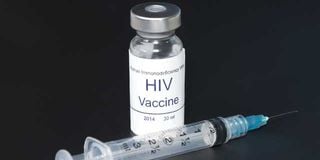Hope as injectable drug shows effectiveness in preventing HIV infection

A study shows it has demonstrated superiority over the daily use of the Truvada drug for HIV prevention.
A new long-acting injectable HIV drug administered two times a year has demonstrated 100 per cent effectiveness, giving fresh hope in the fight and management of the virus.
A study shows it has demonstrated superiority over the daily use of the Truvada drug for HIV prevention.
The study involved more than 2,000 at-risk adolescent girls and young women in South Africa and Uganda, focusing on lenacapavir, a novel HIV prevention drug.
It was assessed by an independent data and safety monitoring board (DSMB).
The DSMB’s review found the regimen to be safe and highly effective, with no HIV infections observed in trial participants who received the regimen.
While the results of the study have not been peer-reviewed, the finding marks a significant advancement in the fight against and prevention of HIV/Aids, particularly for populations at high risk.
About a decade ago, a new preventive drug became a hallmark for scientists in the HIV/Aids space.
Truvada, the first ever pre-exposure prophylaxis (PrEP) has since been embraced by several countries after key regulators’ approval. It is taken as a pill.
Then came Descovy, another pill taken as PrEP.
The United States approved the first-ever long-acting injectable PreP given to at-risk people six times a year in 2021. This drug is, however, still not available in Kenya.
“With zero infections and 100 per cent efficacy, twice-yearly lenacapavir has demonstrated potential as an important new tool to help prevent HIV infections,” said Dr Merdad Parsey, Chief Medical Officer at Gilead Sciences.
“We look forward to additional results from the PURPOSE clinical programme and continuing towards our goal of helping end the HIV epidemic.”
Dr Linda-Gail Bekker, Director of the Desmond Tutu HIV Centre at the University of Cape Town, said if the drug is approved, it could provide a critical new choice for HIV prevention that fits into the lives of many people who could benefit from PrEP.
“While traditional HIV prevention options are highly effective when taken as prescribed, twice-yearly lenacapavir for PrEP could help address the stigma and discrimination some people may face when taking or storing oral PrEP pills, as well as potentially help increase PrEP adherence and persistence, given its dosing schedule,” she said.
Dr Loice Ombajo, an infectious disease specialist who was not part of the study, said antiretroviral drugs bind or kill the HIV that may be introduced in the body to prevent it from establishing itself in cells.
She added that the drug is a form of PrEP.
“In Kenya, we use tablets that are taken daily when one is at risk of an infection. There has been a search for longer acting regimens that do not require to be taken every day,” she said, adding that while there are few longer-acting drugs in other parts of the world, Kenya does not have them.
“Injectable antiretrovirals for prevention are good because they don’t have to be taken daily. They also give young women the choice to take care of themselves, especially in situations they cannot negotiate for safer sex,” she said.
According to Dr Ombanjo, such preventive drugs are designed for everyone but young women stand to benefit greatly from interventions that do not require the partner to participate, or for them to access the drug every day.
The world does not still have a vaccine that can prevent HIV infection.
Aids Vaccine Advocacy Coalition (Avac) Executive Director, Mitchell Warren, lauded the results of the study.
“Additional HIV prevention options means more people finding an alternative that is right for them. Beyond expanded choice, a twice-yearly injection has the potential to transform the way we deliver HIV prevention to people who need and want it most – from an easier-to-follow regimen for individuals to a decreased burden on stretched healthcare systems,” he said.
He added that it is one of the most important results the world has seen in an HIV prevention study. Avac and partners have been working to plan for a successful, accelerated introduction of lenacapavir.





